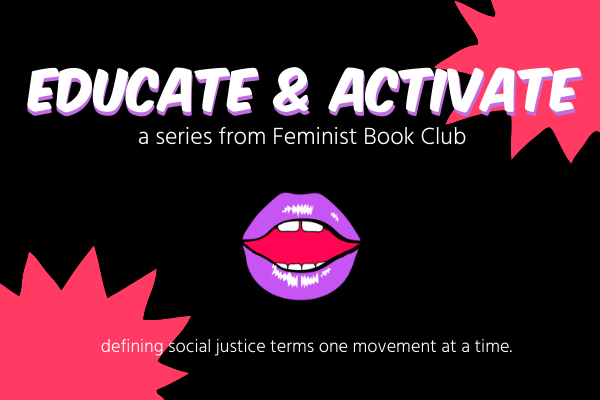Feminist Book Club blog contributors are working together to create posts as an “Educate & Activate” series. We will define a term or movement, provide historical context, and give you additional resources to learn more. We believe that an educated populace can be better activists, accomplices and co-conspirators. It is important to note that these are meant to be brief descriptions and not inclusive or exhaustive of all resources. We urge you to continue being curious, and continue learning more.
Definition
The word queer is used as an umbrella term for all of the identities that are included within the LGBTQIA+ community. Queer can be used in the absence of a specific label, but it can also be used to describe membership within the LGBTQIA+ community. For example, someone who may not specifically identify as bisexual could label themselves as queer to be more inclusive of their sexual identity. Queer can also refer to gender identity. Sexuality and gender identity are spectrums that encompass a multitude of many different identities, so for many, the term queer can be more inclusive of one’s identity than a specific label such as lesbian, gay, transgender, etc. With all of this in mind, queer is an extremely versatile word that can mean something different to each person who uses it.
First Usage
The first usage of the word queer dates back to the sixteenth century in Scotland as a slur to describe someone who is eccentric and suspicious of being a part of homosexual activity. Originally used as a derogatory term for people who identify within the LGBTQIA+ community, the word queer has been reclaimed and reappropriated within the LGBTQIA+ community to symbolize pride in one’s identity.
History
The word queer began to be used in the sixteenth century, but was at the height of its popularity in the 1920’s when the word was used as a synonym for “bad” or “other.” Following The Stonewall Riots in 1969, the word queer began to be used as an act of defiance and liberation from the harmful acts that the LGBTQIA+ community endured. Throughout the 1980’s with the rising cases of HIV/AIDS affecting the gay community, queer became a word associated with courage and the fight to publicly share your identity. At New York City Pride in 1990, an organization of queer activists, called Queer Nation, passed out pamphlets to attendees to promote the need for sharing one’s identity publicly to be their truest selves. With the increasing access to information as the internet developed, the word queer gained popularity in its positive connotation as a reclamation of the struggle that the LGBTQIA+ community has endured. As a result of social media and information sharing, queer is a term that can be commonly heard in reference to one’s sexual or gender identity.
Considering this information, it is important to recognize the original negative connotation of queer and to understand why some may be cautious when using it. For many, queer can still carry this negative meaning and as a result some members of the LGBTQIA+ community feel uncomfortable using it. When considering using the word queer, situate your identities and understand your privilege prior to adding this word to your vocabulary. The reclamation of queer to describe one’s identity is incredibly liberating because it helps people identify in the absence of a label that “fits.”
“We’re here. We’re queer. Get used to it.”
~Queer Nation
Resources to Further Educate
- Video-Tyler Ford Explains the History of the Word “Queer”
- 9 LGBTQ+ People Explain How They Love, Hate, and Understand the Word “Queer”
- Video- What Does Queer Really Mean?
- Is Queer OK to Say? Here’s Why We Use It


